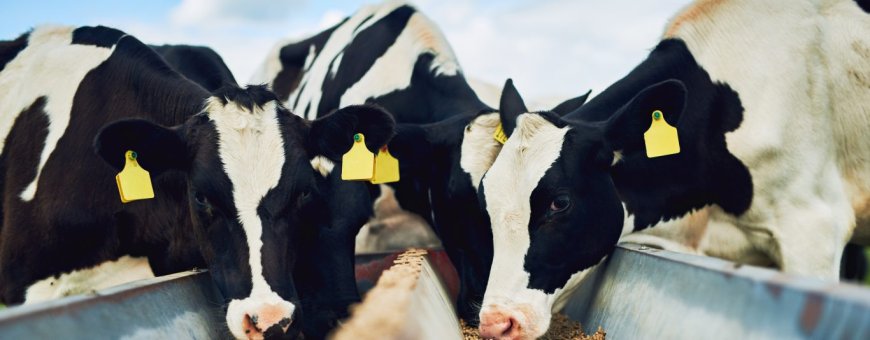Parliament Passes the Animal Feeds Bill – Here's What You Must Understand
According to the specifications outlined in the bill, any individual intending to partake in the production, storage, and distribution of animal feeds must initiate the process by applying for a license. The bill stipulates that these license applications must be reviewed and decided upon within a period of three months.

In a decisive session led by Speaker Anita Among on February 20, 2024, Parliament took a significant stride by passing the Animal Feeds Bill, 2023.
This comprehensive legislation establishes a specialized committee entrusted with the regulation of all aspects relating to animal feed – from its creation and storage to its import and export, as well as its marketing.
As this bill paves the way for enhanced oversight and management within the realm of animal nutrition, join us as we unravel the implications and significance of this momentous decision.
The Animal Feeds Committee, under the leadership of the Commissioner for Animal Production within the Ministry of Agriculture, Animal Industry, and Fisheries, is tasked with administering the issuance of relevant permits in the sector.
According to the specifications outlined in the bill, any individual intending to partake in the production, storage, and distribution of animal feeds must initiate the process by applying for a license. The bill stipulates that these license applications must be reviewed and decided upon within a period of three months.
Similar procedures are mandated for individuals applying for permits for facilities designated for the storage, sale, and manufacturing of animal feeds, as outlined in the bill.
“The secretary to the committee shall, in collaboration with local governments, ensure that animal feeds are produced, stored or sold in safe and fit premises as prescribed in the second schedule,” reads the Bill.
https://twitter.com/CooperatorNews/status/1760340152012963926
According to the Minister of State for Agriculture, Animal Industry and Fisheries, Hon. Bright Rwamirama, the new law will promote the animal industry, cognisant that inadequate animal nutrition has been one of the factors limiting Uganda’s production of livestock products.
“Animal feeds account for 70 per cent of the production costs and therefore, have a significant effect on production costs and profits. The level of nutrition influences the infection rates and disease resistance in animals and the low level of nutrition is therefore, part of the reason for the low livestock and poultry performance in Uganda,” said Rwamirama.
Kimaanya-Kabonera Division MP, Hon. Abed Bwanika, said the legislation is critical not only to animals but to humans who consume animal products. “Animal products end in humans, if the animal consumes feeds with aflatoxins, you can be sure they will enter your body when you consume milk. As we process this Bill, let us not think only about animals but humans as well,” said Bwanika.
Bwanika vouched for the committee created by the Bill and justified the provision requiring the committee to issue exports and import licences within 10 days, from the date of application as the best practice.
“For exportation, the country of destination sets the standards which we have to adhere to, the same applies to importers, we have standards for one to comply to, the period of issuance is fit,” Bwanika said.
The new law will additionally require exporters to obtain a sanitation certificate which will be approved by the committee.
The Attorney General, Kiryowa Kiwanuka, advised that sanitation of animal feeds should be expressly enforced, saying any contamination will affect animal products’ exports from Uganda.
“If you export bad animal feeds, it means your animals are eating bad feeds, this will eventually stop our animal products in other markets. Sanitation is extremely important for us to export quality feeds,” Kiwanuka said.
The chairperson of the Committee on Agriculture, Animal Industry and Fisheries, Hon. Janet Okori-Moe, was pleased with the Bill’s requirement for the agriculture minister to publish widely the list of the approved animal feed control laboratories, saying these will significantly improve the quality of the feeds.
“The Bill requires the producer of animal feeds who owns a laboratory to retain the services of a chemist or animal nutritionist who shall be responsible for the analysis and testing of animal feeds and issue a certificate of analysis for each batch of animal feeds before it is released for sale,” she said.
The new law guards against contamination of animal feeds by prohibiting the use of contaminants and providing safety measures for the transportation of the feeds. It will be at the discretion of the minister to provide guidelines regarding transportation, following the removal of licensing transportation from the Bill.
“These are animal feeds, they are not vaccines that will expire, we cannot ask for a licence but the minister could come up with punitive measures for those who expose feeds to damage and contamination,” said Hon. Aisha Kabanda (NUP, Butambala District Woman Representative).
Hon. Joel Ssenyonyi, the Leader of the Opposition, voiced apprehension regarding the Bill's certificate of financial implication pointing out that while the certificate highlights the government's anticipated expenditures associated with the bill's implementation, it lacks mention of potential revenue. Ssenyonyi emphasized that this omission is often a cause for legal challenges against bills.
“The certificate does not show the social impacts on the economy. It does not show the expected revenue, but the expected expenditure of Shs18.5 billion over five years. This is why these Bills get challenged in court.” he said.
What's Your Reaction?

















































































